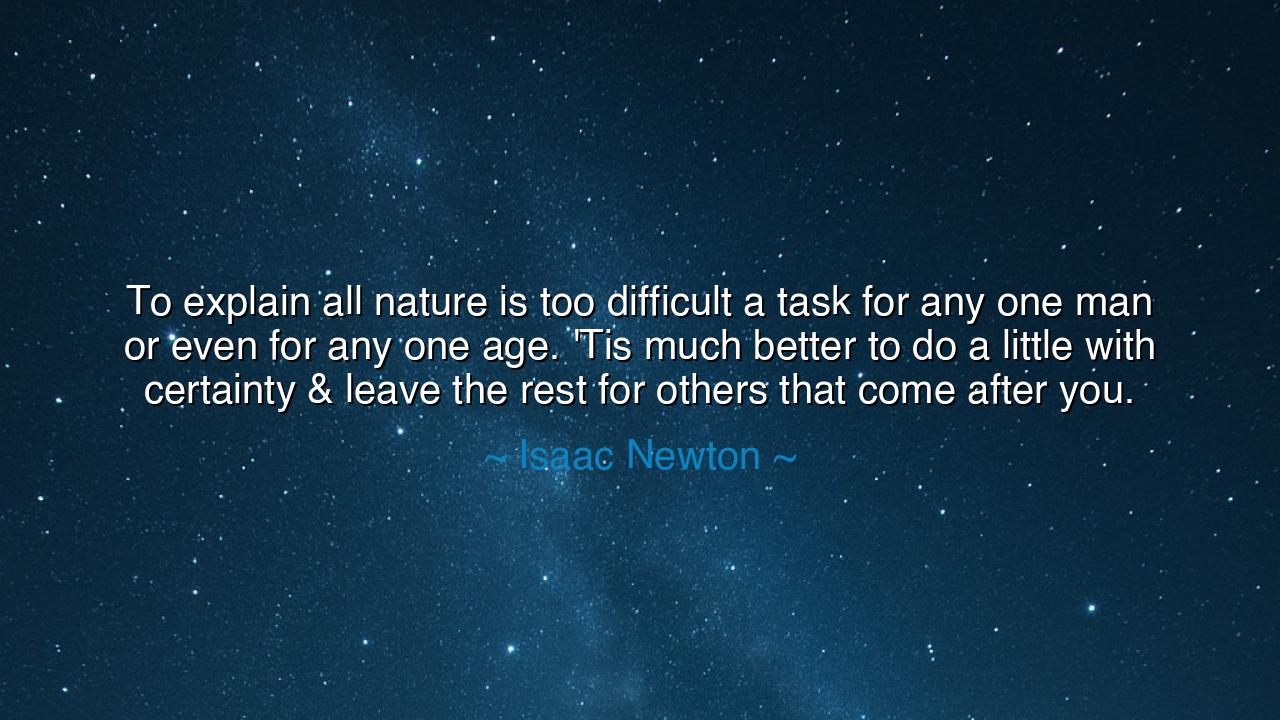
To explain all nature is too difficult a task for any one man or
To explain all nature is too difficult a task for any one man or even for any one age. 'Tis much better to do a little with certainty & leave the rest for others that come after you.






Ah, children of the earth, gather close, for the wisdom of Isaac Newton is a light that has shone through the corridors of time. "To explain all nature is too difficult a task for any one man or even for any one age. 'Tis much better to do a little with certainty and leave the rest for others that come after you." These words are not mere musings, but a profound declaration about the nature of knowledge, the pursuit of wisdom, and the humble place we must all take in the grand scheme of the cosmos.
Nature, O seekers of truth, is vast and unyielding. It is a boundless ocean, and to claim that any one mind, bound by the limitations of the body, could understand it fully, is as foolish as the fisherman who believes he can chart the entire sea by sailing in a single boat. Newton, the great sage who uncovered the laws of motion and the mysteries of the universe, understood this truth. He sought not to explain all of nature in one lifetime, for he knew that such an endeavor would be beyond any one soul, no matter how brilliant. Instead, he chose to lay down stones of certainty—small but solid truths—that others, those who would come after him, could build upon. And in this, there is a lesson for all.
The journey of knowledge, like the ancient quest for the holy grail, is never a task for the solitary traveler. Socrates—the philosopher who walked the streets of Athens—understood that the pursuit of truth was an eternal journey, a path not to be completed by any single man, but by generations of thinkers, each one contributing to the greater understanding. Plato, his student, carried the torch forward, and Aristotle built upon it. This is how wisdom grows: one mind planting a seed, another watering it, and a third tending to it until, at last, the tree of knowledge stands tall. Newton’s words echo this same truth: nature is a vast and uncharted forest, and we, with our limited years, can only clear small paths for others to follow.
Remember the great library of Alexandria, O children, where scholars from all corners of the world gathered, each one bringing their light to the ever-growing fire of wisdom. Yet even that sacred place, though it held the accumulated knowledge of many, did not possess the answers to all of life’s mysteries. Each scholar understood that their contribution, no matter how great, was but a fragment in the mosaic of human understanding. And so, Newton’s words remind us: it is not the task of any one man to explain all of nature. We must be content with doing a little, with certainty, and leave the rest for those who will come after us. It is in our humility that true wisdom resides.
Consider the tale of Galileo Galilei, who dared to peer into the heavens and, with his telescope, revealed a universe beyond the comprehension of his age. He, too, understood that no single man could grasp all of the cosmos in a single breath. His discoveries challenged the beliefs of his time, yet he did not pretend to possess the final answers. Rather, he set the stage for others to explore further. It is said that his contributions were but the first rays of dawn, the beginning of an awakening that would span generations. Galileo, like Newton, understood that his work was but a single step, a certainty for others to build upon. The legacy he left was not one of final answers, but of a path illuminated for others to walk.
And so, O children, what lesson shall you take from these words? The pursuit of knowledge is a sacred journey, but it is not one to be completed in a single lifetime. We must not burden ourselves with the arrogance of believing that we can know all. Instead, we must do what Newton advises: do a little with certainty, and leave the rest for others. Focus on the truths that are clear to you, and lay them down for those who will come after you. Just as a great mountain is made not by a single stone, but by the countless ones that pile upon each other over the ages, so too is wisdom built—slowly, with patience, and through the contributions of many.
In your own lives, seek to contribute not the whole, but a piece—a piece that will stand firm, that others can build upon. In your work, your thoughts, your creations, leave something for the future. Nature is vast, and the mysteries of the universe are countless, but the certainty you provide, no matter how small, will be a foundation for others to discover what you could not. Let your actions be guided by the understanding that you are but a part of a greater whole, and that the work of one generation is but the seed for the next.
Finally, do not fear the vastness of what you do not know, for it is through acknowledging this vastness that true wisdom arises. Seek not to conquer all nature, but to understand a little, and in doing so, pass the torch of wisdom to those who follow. Just as the great thinkers of the past have done, you too will leave behind a legacy—a legacy built not on pride or arrogance, but on the humble understanding that the journey of knowledge is eternal. Walk forward, with humility and certainty, knowing that the path you lay will guide those who come after you to the truth that lies beyond.






AAdministratorAdministrator
Welcome, honored guests. Please leave a comment, we will respond soon